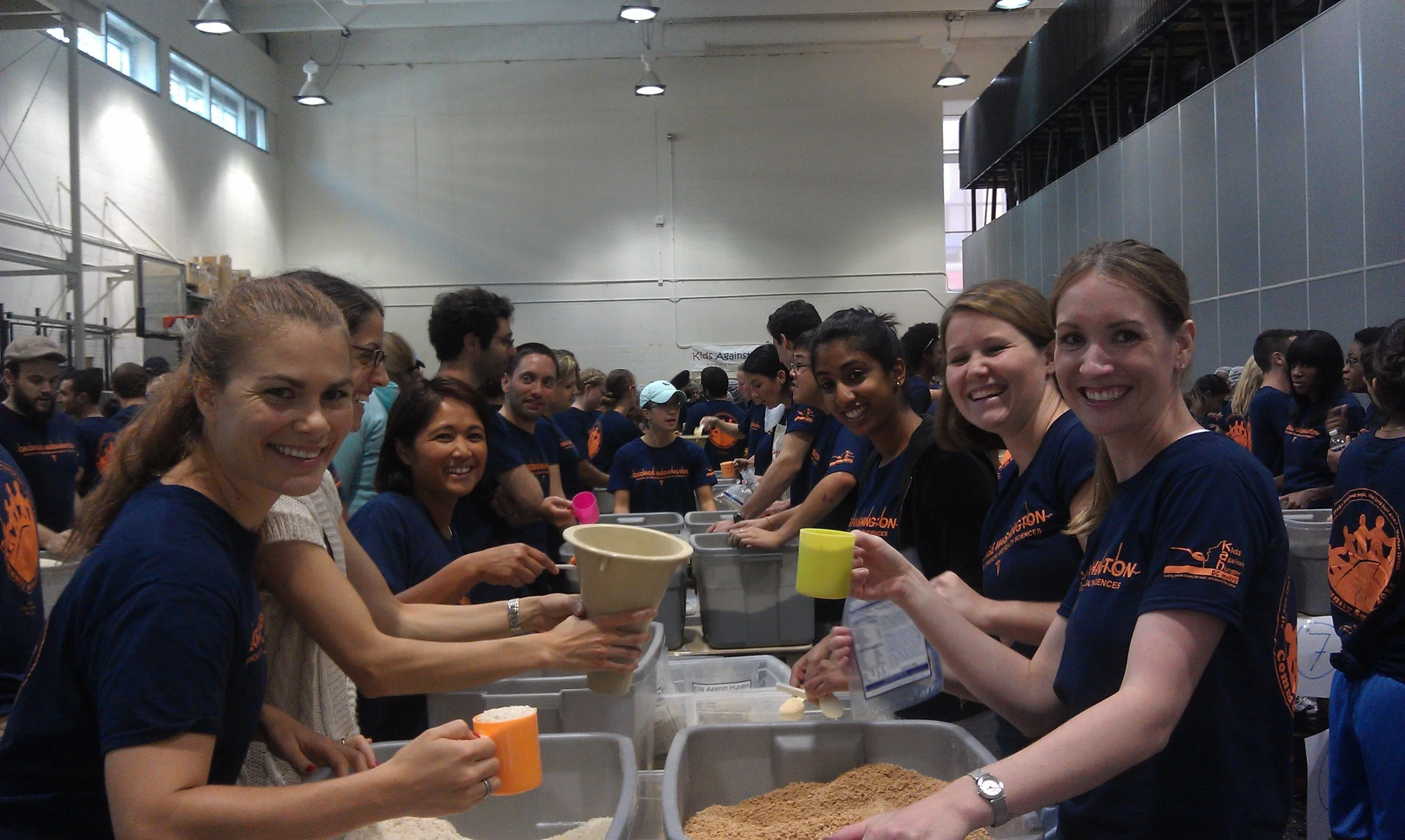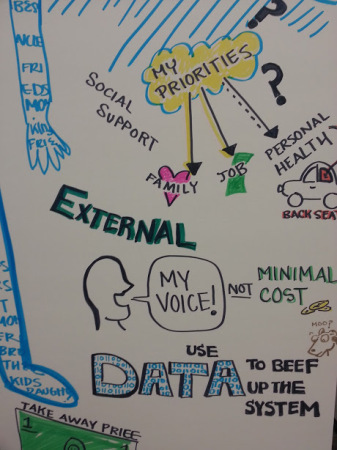Core Values
Principles Driving Our Profession
Did you know that the word “core” has its origins in ancient Hebrew and Phoenician? Kor (כור) was a measure of ‘capacity’ or how much a particular container can hold. Modern examples would be a cup, gallon, liter, and so on... Just because I know you are curious, 1 Kor = approximately 60 gallons or 227 Liters.
The Romagnoli Family circa 1988
Though a bit less tangible than a unit of measure, we all inherently know what values are. Even the smallest child understands when you deprive them of their most prized possession or the company of their mom or dad for too long. They are things, ideas, or beliefs which we hold dear. Some values change as we do, most of us aren’t too attached to our teddy bears or pacifiers; others seem to be hard wired into the very essence of being. Now, I know that sounds mighty deep and humanist and I most certainly do not believe in the universality of my point of view. Nonetheless, there often do appear to be tenants that most people use as a basis for ethical action.
As I read through the values of my chosen profession, I delight in the symmetry of ideals which line the tenants that drive us as healthcare professionals and my personal beliefs. Here I would like to explore each of the core values of the American Physical Therapy Association by focusing on an individual or an experience I have encountered in my tenure as a student that fully embodies the particular value.
Altrusism
People do not lead with "Hi, I'm Brooke Miller director of therapy, COTA, mom, girlfriend, daughter, ...." They pick the most appropriate given the situation and in Brooke's case she manages to keep them all in balance, seamlessly holding a high degree of accountability to herself, her daughter, and her patients.
Click here to read more about: Brooke.
The PT program at The George Washington University prides itself in being involved in and serving the community around us. We work hard academically and to hone our skill professionally. However, one of the things that drew me to this program was its emphasis on setting aside time to volunteer and connect with the people outside of the university. Each fall we challenge ourselves as a department to participate in 1,000 hours of service in the community. While traveling for my internships I've been able to stay connected with this commitment to service:
Caring / Compassion
Regardless of setting, a good physical therapist must have an acute attention to detail and be a good listener... you never know when you will pick up on some small element to improving care or quality of life for your patient. One of the biggest things I have learned from working in a long term skilled nursing facility, is the utmost importance of observation and listening. It is easy to forget that when you knock on your patient’s door for a visit you are entering their home. From the pictures they choose to put on the wall to quilt on their bed, each little detail is a story about who this person is. There are little things one can do to make a person’s day a little brighter, bringing someone their morning coffee or pushing them the extra distance to the dining room when they are tired can make a big difference in someone’s day.
Skip’s Doodles:
Sometimes, I get the feeling that artists (and like minded creative types of all sorts) can just sense each other. Skip and I had worked together in the therapy but when I walked into Skip’s room his walls were adorned with beautiful paintings and drawings I knew we were cut from the same cloth. Over the course of my rotation at the nursing home, I learned the art on the wall were paintings he made! We have compared sketchbooks and I even discovered he had a penchant for drawing on unusual materials (me on coffee cups and Skip on napkins). He collected his napkins everyday and we decided we could share his work with the world (and more importantly his family who lived up in Montana) by creating a website. Skip has learned how to use his IPad to take pictures of his napkins and mail them to me to post to his new site:
I’ve always believed music can turn any moment from sour to sweet. My new friend and roommate of one of my patients, Mr. Armistead felt the same way and he delighted in playing the demos on the keyboard in his room. When I asked if he played, he said the arthritis in his hands has made it too difficult to play anything as nice as the demos. He soon learned that I played and before treatment sessions I would play a quick song before we headed to the gym...”It was nice,” he said, “to hear something different than the built in keyboard demo.” One morning, I asked if he knew “Heart and Soul” the duet, perhaps I thought, if we played together he would enjoy the sound. So we practiced a couple of times, his hands started to loosen up and before I left that day we were making beautiful music together.
Check out a recording we made from later in the week, Cristina on top and Mr. Armistead on bottom:
Excellence
Using the best evidence to support our clinical practice as physical therapists is essential. It is what crosses you from the threshold of being a good clinician to being an excellent one. As a student in the fast paced acute care setting it was often very difficult to keep apprised of all the various conditions and best practices for the slew of co-morbidities presented in our patients ...
Read More: "Striving for Excellence In the Jungle"
Professional Duty
Whether speaking to a stranger on the train, engaging with friends and family about nature of physical therapy, or you have a larger audience we all have the obligation to be advocates for our patients and for our profession. When I started doodling on cups several years ago and my blog formed from those scribblings, I had no idea that it would develop to become a forum for advocacy and education. Click on the below links for some examples of how I’ve developed blog posts to be a positive voice for Physical Therapy:
Yesterday, the American Physical Therapy Association and fellow members of the Therapy Cap Coalition participated in the 2nd grassroots campaign to ensure that Congress addresses the Medicare Therapy Cap before December 31, 2013!
At the first grassroots campaign back in November 1,000 APTA members sent more than 3,000 e-mails to Capitol Hill, asking Congress to address the therapy cap by December 31, 2013. An additional 250 nonmembers, including patients, sent 801 e-mails to members of Congress.
Yesterday was the big push…BUT THERE ARE 28 DAYS LEFT for you to get your advocacy on:
#StopTheTherapyCap
You can help! Share these links :
APTA Members: Go to APTA’s Legislative Action Center, click “Take Action” under “Stop the Medicare Therapy Cap & Prevent SGR Payment Cuts,” and follow the instructions. If you have time, please personalize the e-mail and tell Congress how the cap impacts your patients.
Nonmember PTs/PTAs and Patients: E-mail your legislators using our Patient Action Center. Simply enter your zip code and click “Go!”
Integrity
As I have grown as an individual and developed as a health care practitioner, I have realized that being confident and true myself and my personal values is one of the most important attributes to possess. When a strong personal integrity is developed we are able to stand strong against the most demanding challenges. We can’t always change the things around us. Indeed so much of our lives is out of our control. Consider your path this last year, when I do, I think of all the things that didn’t turn out as I expected … both for the good and bad. I had so many adventures and some of the best were unplanned. Sometimes, something that initially felt like one of those “bad” paths ended up taking somewhere beautiful. So really, the only thing we truly have control over is the way we react to these uncontrollable elements that are such an integral and exciting part of life.
So let go.
Allow yourself to adventure, let all those crazy, uncontrollable components of life wash over you and find yourself happy and centered on your journey.
After Combined Sections Meeting in Las Vegas this year, I found myself on an personal adventure to the Grand Canyon.
Social Responsibility
As healthcare practitioners we MUST advocate for our patients and give them the forums to advocate for themselves. This spring, I was involved in TED MED's Great Challenges, an initiative to provide communication and discussion about the challenges facing the health care community in the next 10 years.
We used a variety of social media platforms to virtually discuss issues such as: prevention, the obesity crisis, medical innovation, chronic diseases, and healthcare costs. When the conference convened in D.C. we were able to meet face to face and speak in person about the issues we have been addressing over the last year. The conference featured round table discussions with experts on the topics and the use of graphic facilitators to visually represent the ideas:






I noticed during our discussions, from the inside, as health care providers, we have a particular view. What was particularly interesting was to hear from the individuals on the outside, the patients. We made an effort in our Great Challenge initiative to include individuals who were on the other side of these issues and bring them into the conference to participate in our discussions. I found they brought an insight that would be easily overlooked by the doctors, therapists, economists, and administration involved. I am so grateful to have been a part of this initiative but also because it inspired me to use this approach in my future endeavors, to be an advocate for my patients but also to provide them the space to advocate for themselves.
Last year I attended The Johns Hopkins Critical Care Rehabilitation Conference on a student scholarship and this year I have coordinated their social media efforts and am responsible for the virtual forums to discuss improving ICU patient outcomes. I was so excited that I was able to take what I learned at TED MED and bring in not only students but patients into the conference to participate in the dialogue regarding critical care and rehabilitation. I set up for these individuals to have scholarships to attend and to participate as “social media narrators” to give voice to the other side of the healthcare continuum. Follow our discussion and participate in the narrative at:
#icurehab


















